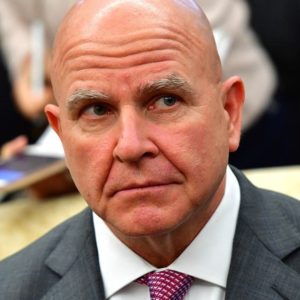Generalship: High Command in War
Examine what it means to command at the very highest levels of war with a former CENTCOM commander.
June 15–June 21, 2025
Washington, DC
This course serves as the opening week of the Security Studies Program.
Using readings from canonical strategic thinkers and episodes from military history, it offers fellows an introduction to the principles and complexities of geopolitics.
Aaron MacLean on D-Day's Lessons
This course is part of our residential Security Studies Program. Fellows participate in morning seminars and meet national security leaders and experts over afternoon and evening sessions. Up to 16 fellows will be selected.

Aaron MacLean is a senior fellow at Hudson Institute and the host of the School of War podcast. Previously, he was senior foreign policy advisor and legislative director to Senator Tom Cotton of Arkansas. Aaron served on active duty as a U.S. Marine for seven years, deploying to Afghanistan as an infantry officer in 2009–2010.

Aaron MacLean is a senior fellow at Hudson Institute and the host of the School of War podcast.
Previously, Mr. MacLean was senior foreign policy advisor and legislative director to Senator Tom Cotton (R-AR). He served on active duty as a United States Marine for seven years, deploying to Afghanistan as an infantry officer in 2009–10. Following his time in the operating forces, he was assigned to the faculty of the US Naval Academy, where he was the 2013 recipient of the Apgar Award for Excellence in Teaching.
Mr. MacLean received a B.A. in philosophy and the history of math and science from St. John’s College, Annapolis, and an M.Phil. (Dist.) in medieval Arabic thought from the University of Oxford. He has been a Boren Scholar and a Marshall Scholar and lives in Virginia, where he was born.

Mike Gallagher served for four terms in the U.S. House of Representatives as Wisconsin’s 8th Congressional District representative. Previously, he served seven years on active duty in the U.S. Marine Corps, including two deployments to Iraq.

Mike Gallagher served for four terms in the U.S. House of Representatives as Wisconsin’s 8th Congressional District representative. Previously, he served seven years on active duty in the U.S. Marine Corps, including two deployments to Iraq. He also was the lead Republican staffer for the Middle East and Counterterrorism on the Senate Foreign Relations Committee and worked in the private sector at an energy and supply chain management company in Green Bay.
Mr. Gallagher was the honor graduate from The Basic School, the Marine Corps CI/HUMINT Basic Course, as well as the MAGTF Intelligence Officers Course. He earned a Ph.D. in International Relations from Georgetown University. He also earned a Master’s degree in Security Studies with honors from Georgetown and a Master’s of Science in Strategic Intelligence from National Intelligence University. He earned his Bachelor’s degree from Princeton University with a focus on Near Eastern Studies and Arabic.
Readings:
For Discussion:
Readings:
For Discussion:
Readings:
For Discussion:
Readings:
Discussion:
Readings:
For Discussion:

Gen. Kenneth F. McKenzie Jr.
Gen. Kenneth ‘Frank’ McKenzie Jr. is the former Commander of United States Central Command. He led a distinguished 42-year military career, commanding at multiple levels within the Marine Corps and serving on the Joint Staff. His leadership roles included commanding the First Battalion, Sixth Marines, and the 22nd MEU (SOC) during combat deployments to Afghanistan and Iraq.
Mike Gallagher
Mike Gallagher served for four terms in the U.S. House of Representatives as Wisconsin’s 8th Congressional District representative. Previously, he served seven years on active duty in the U.S. Marine Corps, including two deployments to Iraq.
Aaron MacLean
Aaron MacLean is a senior fellow at Hudson Institute and the host of the School of War podcast. Previously, he was senior foreign policy advisor and legislative director to Senator Tom Cotton of Arkansas. Aaron served on active duty as a U.S. Marine for seven years, deploying to Afghanistan as an infantry officer in 2009–2010.

Daniel Blumenthal
Dan Blumenthal is a senior fellow at the American Enterprise Institute, where he focuses on East Asian security issues and Sino-American relations. Mr. Blumenthal has served in and advised the US government on China issues for more than a decade.

Christian Brose
Christian Brose is a Senior Fellow at the Carnegie Endowment for International Peace and the Head of Strategy at Anduril Industries, prior to which he served as staff director of the Senate Armed Services Committee. He was also responsible for leading the production, negotiation, and passage of four National Defense Authorization Acts, which set policy and authorized spending for all U.S. national defense activities.

Matthew Kroenig
Matthew Kroenig is a Professor in the Department of Government and the Edmund A. Walsh School of Foreign Service at Georgetown University. A 2019 study in Perspectives on Politics ranked him as one of the top 25 most-cited political scientists of his generation. He has served in several positions in the U.S. Department of Defense and the intelligence community in the Bush and Obama administrations.

H.R. McMaster
H. R. McMaster is the Fouad and Michelle Ajami Senior Fellow at the Hoover Institution, Stanford University. Previously, he served as the 26th assistant to the president for National Security Affairs and as a commissioned officer in the United States Army for 34 years before retiring as a Lieutenant General. He is author of Battlegrounds: The Fight to Defend the Free World.

Vance Serchuk
Vance Serchuk is Executive Director of the KKR Global Institute and an Adjunct Senior Fellow at the Center for a New American Security. Prior to joining KKR, Mr. Serchuk served for six years as the senior national security advisor to Senator Joseph Lieberman (I-Connecticut).